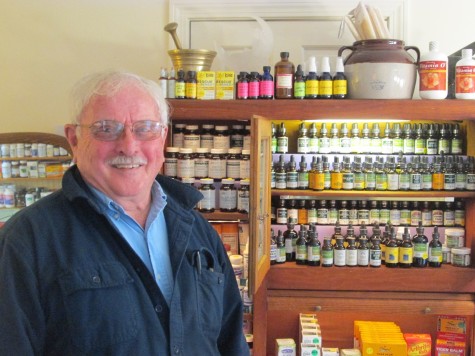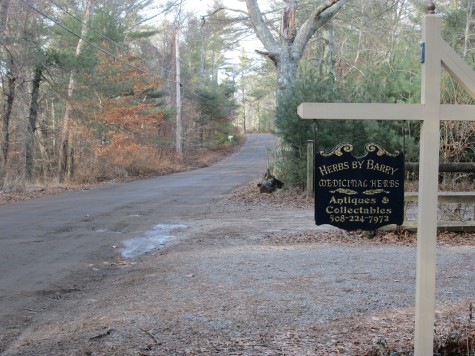Natural Remedies Demystified: Meet Barry the Herbalist
January 22, 2015

It was a surprisingly warm day when I set off in La Bamba, (my large gray Buick) to go investigate rumors of a mysterious healer that reportedly lived on West Long Pond Road.
As I neared my destination, my mind conjured images of reclusive old men in robes with long white beards leaning on gnarled staffs, inhabiting mountainous caves and tenaciously guarding the secrets of the ancients. When I finally turned onto the dusty West Long Pond Road I realized that this was a part of Plymouth that I had never known existed.
The sun-dappled road stretched on underneath a tunnel of trees, beckoning me to follow it to wherever its destination might be. However, almost immediately a small black sign with neat gold lettering on the side of the road confronted me. It read “Herbs by Barry” and directed me down a narrow dirt driveway to a beautiful house nestled underneath massive pines. I swung the brass knocker on the front door.
Almost immediately a very kind woman came to the door and I explained that I was looking for Barry. She directed me down a winding, pine needle carpeted path to a gorgeous pond. On its shore, dressed quite normally, lacking a long white beard, and peacefully enjoying the beauty of his backyard, sat the man whom I had journeyed to see.
I introduced myself and explained my lifelong interest in herbs and natural medicine. With a warm handshake and a welcoming smile he introduced himself as Barry and offered to show me his shop. I followed him into a small, neatly furnished outbuilding filled with vials, dried herbs, and beautiful antiques.
Without hesitation he began teaching me about the various and fascinating aspects of herbalism, of which I still learn more about every time I visit. Months later and in much cooler weather Barry and his lovely wife welcomed me into their home to conduct the following interview:
Me: How did you begin studying herbalism?
Barry: “Years ago, when I was a young man, probably in my thirties, I read a little article in the paper, and this fellow had written it, and the caption was “Would You Like to Heal The World?” and he was going to be doing a talk in Lexington. And I went to hear his talk and was very impressed by the gentleman, and he turned out to be a holistic practitioner. I ended up consulting him and he recommended some herbs for me to take, and I was really impressed with the way they worked. And that’s what got me started with my interest in herbs. I had a friend who practiced iridology (diagnosing illness based on the iris), and I began recommending and selling herbs to his patients. And then I started bringing in herbs and selling them, and that’s what I’ve been doing for about 27 years now out of the house.”
Me: What do you personally enjoy about practicing herbalism?
Barry: “The reason I do it is because I enjoy working with people. And if I can help people that have some kind of condition, then that gives me satisfaction. I don’t do it to make money, because I don’t make money! (laughs) The other reason is that I enjoy spreading the word about herbs because they are so good, and generally don’t have the negative side effects that allopathic (standard western) medicine does.
Me: Why do you think that society as a whole is much more interested in allopathic medicine rather than traditional medicine?
Barry: “That’s a good question. I don’t know that I have a clear answer for that because it has just been a trend in our society, it’s been a trend in allopathic medicine to go with manufacturing medicine instead of using natural cures. And unfortunately the motivation behind that trend has been financial. Because you cannot patent an herbal medicine. But if you can bring that herb into the lab, and break it down chemically, and reproduce it, and maybe make a little twist to it, you can then patent it and sell it. A good example of this practice is aspirin. Willow tree bark contains natural aspirin, and they brought it into the lab and extracted the part that soothes pain, and began to sell it as aspirin. But they left out the part that soothes the stomach. So now when we take aspirin we get stomach ulcers. Herbs are interesting from the point of view as opposed to allopathic medicine that many times on herb will heal several different conditions in the body. And if you come to me to ask for one specific herb to treat a specific ailment, you may find that other issues that may not have bothered you as much fall aside.
Me: What herbs would you recommend taking for people my age? I myself and many of my peers have to deal with stress and difficulty getting enough sleep.
Barry: Herbs for stress, specifically adrenal stress, because most everyone in the world today is suffering from adrenal stress. There are formulas that I make that address adrenal stress, but one particular herb to treat it would be licorice. A lot of times people who do public speaking, who are uncomfortable doing it, will suck on a couple pieces of licorice root while they’re speaking because it helps to support the adrenals. Another would be valerian, because it strengthens your nervous system to help you deal with stress. And it also helps you get to sleep and stay asleep, so you’re not waking up at two in the morning thinking about all the worst things in life that you think of at that time.
Me: In my seventeen years in this world, I have noticed that it is infinitely easier to destroy something than to create it or mend it back together. What are your thoughts on the spiritual role of a healer?
Barry: “I was in the army during Vietnam, and I was a medic, and I worked in hospice work for three years, and that was extremely rewarding. Not because you’re actually doing much to make the person well again. Everything you’re doing is on the emotional level and medicating the person to make them comfortable. In my life I always seem to be drawn to healing. “
Me: What is the biggest impact healing and working with herbs has had on your life?

Barry: “I guess the biggest impact is the satisfaction that I get when I have the opportunity to do something for somebody and it works and they are better off for it. It’s also that because of my involvement with the herbs, I am continually learning. I subscribe to the publications of a large number of naturopathic doctors who write about nothing but herbs. Whether they have discovered a new use for an old herb, or a new medicine has been discovered in the rainforest.”
(We began to discuss allopathic medicine.)
Barry: “I don’t want to sound too hard against allopathic medicine. The truth of the matter is that it has its place, and I use it too. And there are good things it can do. Unfortunately I think it has lost a lot of the healing and caring that used to be part of it. The problem is allopathic medicine won’t open itself up to the alternative, whereas I think the alternative opens itself up to the allopathic way much more. I recently got an article on an herbal cure for Parkinson’s disease and another for brain cancer. Allopathic medicine has no cure for Parkinson’s disease or brain cancer. And there is a part of the medical community that is aware of these treatments. But suppresses it because there is no money to be made. The American Medical association has made the statement that “Nothing can cure disease but medicine. Only FDA approved medicine can cure disease.” There are cures for illnesses already there that have not been accepted by allopathic medicine.”
Barry then took my hand and demonstrated the ancient method of reflexology, or the belief that applying pressure to certain places on the hands and feet has a therapeutic effect on corresponding zones of the body. I thanked Barry and his wife for giving me their time and drove back home in La Bamba’s motherly leather interior feeling very awed and enlightened. Knowing Barry has taught me among other things that to many things in life, not just medicine, there is an alternative.
This is the first in a series of columns Dylan will be writing on interesting and unique places in America’s Hometown